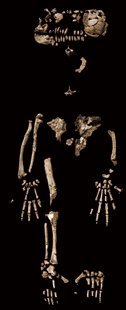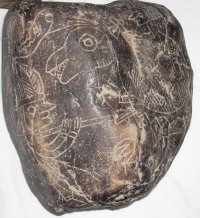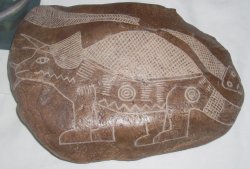Newsweek likes to regularly publish information that supports evolution as true. The July 9, 2007 issue includes a sidebar, not related to the article it is with in any way I can see, that provides three transitional forms that have been found in the fossil record. Or are they?
First, a good general rule of thumb is that whenever it is announced that a fossil missing link has been found, give it ten or so years for all the facts to come out. It took 40 years from when
Piltdown man was "found" until it was shown to be a fraud. Originally the
Coelacanth (a fish) was thought to be a transitional form having "fins" used for moving on the watery bottom, until a living
coelacanth was discovered (
Latimeria chalumnae) and it turned out the fins were used solely for swimming. Time after time, every transitional fossil has turned out to not be what it was originally proclaimed to be.
Let's look at the three transitional fossil in the Newsweek article. To keep this post relatively short, I'll provide a link to explanations describing what has actually been found (no science-based transitional fossils):
Tiktaalik Roseae: This is the latest transitional fossil find. Calling this a transitional fossil has many problems, even at this early stage. What really bothers me is, not only does this fossil not have the characteristics needed for a transitional form, in trying to fit it into an evolutionary sequence of fossils the fossils in that sequence have had their size and position in the sequence distorted. If scientists are going to present "evidence," at the least it should not include intentional distortions.
Archaeopteryx: The first thing I notice about this fossil was its history. Discovered in 1861, it came from an amateur collector and local doctor Carl
Haberlein, who had received from another person it in lieu of payment for medical treatment. On the other hand, when human fossils are discovered in layers dated to the same age as dinosaurs, professional paleontologists refuse to work on recovering them, so amateurs recover the bones... the "scientific community" calls the discoveries invalid because they were not excavated by professions. So archaeopteryx was excavated by an unknown person who could not pay his medical bills, and it is enshrined as a transitional fossil. My problem is not with amateurs, it is with the double standard.
Is Archaeopteryx a transition from reptile to bird? No, it is not. In 1984 at the
International Archaeopteryx Conference scientists agreed that
Archaeopteryx was a true bird, not a transitional form. Only a small minority of scientists continue to push for it as a transition form. Why then do publications such as Newsweek still promote Archaeopteryx as a transitional form? Because, even though it is not factually true, it provides compelling evidence for evolution. Evidence based on... nothing.
Pakicetus: A few skull fragments were discovered in Pakistan. They appeared to be from a wolf-like creature that allegedly had an inner ear like a whale’s. Thus these fragments were announced as a transitional form showing a land animal that had become an aquatic ancestor of today's whales. In 2001 research published in Nature showed that
Pakicetus was a true land animal, not aquatic. So the theory was reversed and
Pakicetus was declared a land animal that is a descendant of whales... although that means the animal we see living today is older than the extinct animal that followed it. Isn't that backwards???
Solid anatomical data now shows the
Pakicetus is not an ancestor of the whale.
To find out what really happened pick up your Bible and read Genesis chapter one. Evolution and Darwinism keeps producing evidence that isn't evidence and theories that keep changing. Yet nothing that has been found has contradicted the Biblical account, and the scientific evidence that the Bible is true continues to grow. All of the land
animals, including dinosaurs were created on day six of creation. About 1,400 years later there was a catastrophic world-wide flood that buried billions of dead things in rock layers around the world... the fossils we see today.
Labels: Darwinsim, evolution





